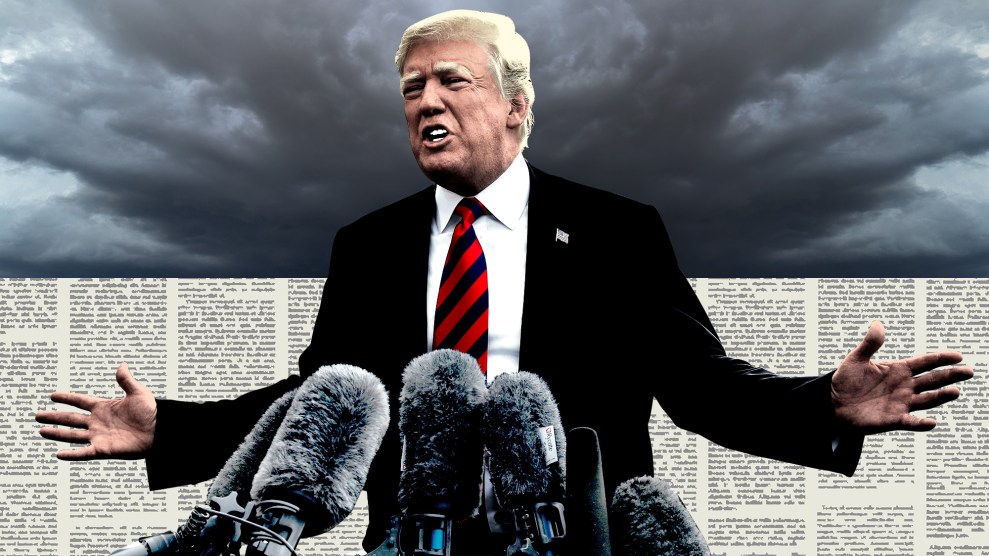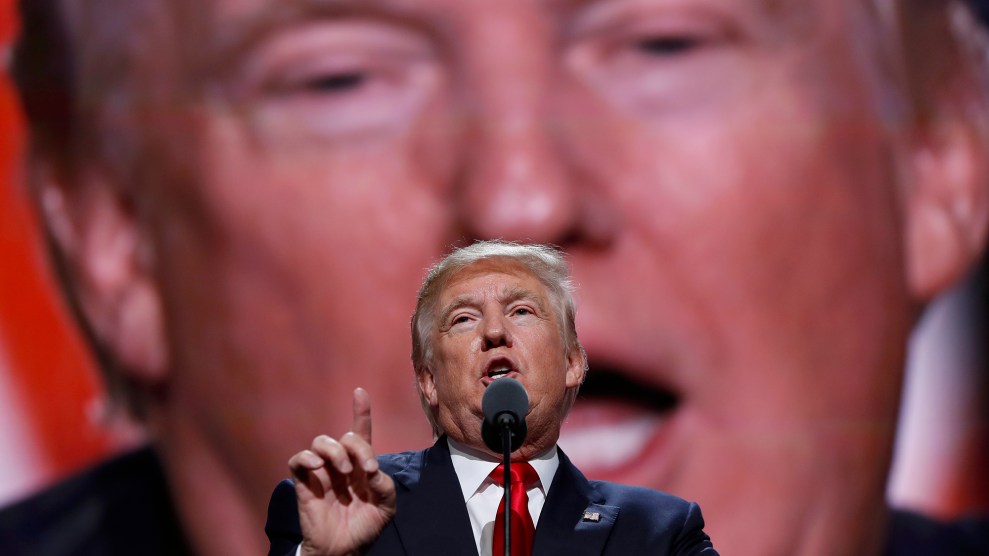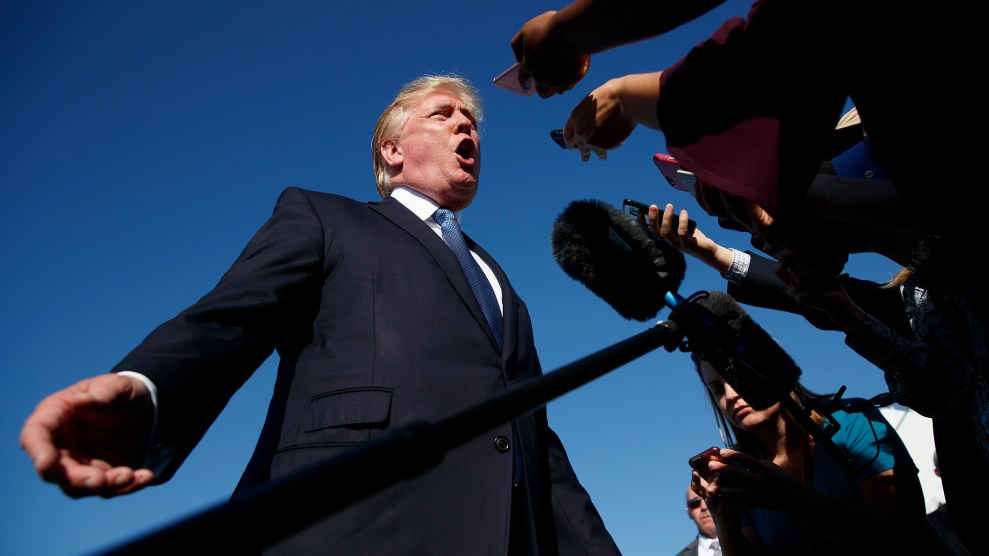
Mother Jones illustration; Manuel Balce Ceneta/AP; Getty
Ever since he campaigned for the White House, Donald Trump has attacked news outlets for their reporting, singled out individual journalists for scorn, and turned his battle cry against “fake news”—a.k.a. reporting he dislikes—virtually into a personal brand. His hostility has only escalated with scrutiny of his presidency. Whipping up crowds as he points at the press gallery has been a set piece of his political rallies. He describes journalists as “dishonest,” “corrupt,” and “sick.” And Trump has repeatedly echoed the language of 20th century despots, demonizing the American media as “the enemy of the people.”
Presidential disdain for the press is nothing new. Still, political and media experts have long worried that Trump’s uniquely broad and bitter war of words wouldn’t just corrode public trust in reported facts, but could also produce other dangerous effects.
Now there is strong evidence it has. According to half a dozen law enforcement and security leaders I spoke with in recent weeks, the targeting of journalists has steadily intensified in the Trump era, from organized campaigns of personal harassment to bomb threats and vows of assault, rape, and mass shootings. Two sources told me they’ve repeatedly seen explicit evidence of threats directly channeling the president’s rhetoric.
An example surfaced at the end of August with news the FBI had arrested a California man, Robert Chain, for allegedly threatening to travel to the offices of the Boston Globe and commit a mass shooting. His menacing communications came just after the Globe announced a coordinated editorial effort among newspapers nationwide to denounce Trump’s attacks on the press as anti-American and dangerous.
“You’re the enemy of the people, and we’re going to kill every fucking one of you,” Chain said in one of several anonymous calls to the Globe, according to the FBI. In another, he vowed, “We are going to shoot you motherfuckers in the head.” According to the Globe’s own reporting on the case, authorities found 20 firearms in Chain’s home, including a semi-automatic rifle he’d purchased in May.
It was not the first glimpse of the potential danger. Earlier in August, a reporter shared an anonymous threat called into the Los Angeles bureau of the Associated Press: “At some point we’re just gonna start shooting you fucking assholes.” CNN’s Jim Acosta recently publicized a video of an angry swarm of people taunting him as he broadcast from a Trump rally in Florida. And MSNBC anchor Katy Tur, who covered Trump and was openly ridiculed by him on the 2016 campaign trail, spoke on-air about some of the vicious harassment she has faced: “’I hope you get raped and killed,’ one person wrote to me just this week,” Tur said. “And in case you want to argue that this has nothing to do with the president, the most recent note I got ended with ‘MAGA.’”
Threats and harassment are an age-old problem for news organizations, stemming from all manner of grievances and often marked by incoherent or empty bluster. But the veteran law enforcement and security leaders I spoke with, including top officials at two major media companies, conveyed sobering levels of concern about the Trump-fueled phenomenon. (The officials asked not to be identified in order to discuss sensitive subject matter.) Both the frequency and the temperature have been rising, they said.
“It’s very troubling,” said a senior US law enforcement agent with expertise in threats against public figures. “I do think it’s dangerous for the president to walk this line of basically inciting violence,” the agent said. “Most people won’t act on it, but sooner or later, someone will—a person who can’t distinguish from the political message. We’ve been seeing some prospects of this. People could get injured or killed.”
“The volume has definitely picked up,” said a security director for a major television news network, describing bombing and other death threats. “We’ve had multiple cases of people using the same rhetoric as the president,” he told me. He shared language from a recent suspect: “I swear allegiance to my leader, and he says you’re fake news, you’re the enemy. I must rid the country of you because you’re the enemy of the people.”
The network has consistently faced a spike in threatening activity after Trump has disparaged it by name, according to the security director. The bulk of the threats, he said, have been aimed at correspondents who cover the White House and the Trump-Russia investigation.
There has been no indication of concern about the problem from the Trump White House. On August 30, as initial excerpts from journalist Bob Woodward’s book on the Trump presidency commanded wide media attention, Trump reiterated his disdain: “I just cannot state strongly enough how totally dishonest much of the Media is,” he said. “Truth doesn’t matter to them, they only have their hatred & agenda…Enemy of the People!”
The news of Chain’s arrest broke later that morning, sparking renewed media discussion about Trump’s rhetoric. The president himself said nothing about the threats to the Globe. But that night, at a campaign rally in Evansville, Indiana, he was right back at it with his familiar jeremiad against the “failing” New York Times, Washington Post, and CNN. “These are just dishonest, terrible people,” Trump said emphatically, waving a finger at the press gallery as the crowd jeered. “I’m telling you that. Terrible people.”
I asked former Trump White House communications director Anthony Scaramucci—who has said he doesn’t like Trump’s war on the media—if he would urge the president to cease the incitement. Scaramucci replied that he had already done so. He did not reply to follow-up questions I sent asking about how Trump responded. White House press secretary Sarah Huckabee Sanders also did not reply to my requests for comment.
Chain’s threatening calls in August included him condemning the Globe’s reporting on Trump as “treasonous and seditious.” But even after that disclosure from the FBI, Trump went on to use such rhetoric. During a live interview with Fox News on September 6, as Trump stood among thousands of supporters assembling for a rally in Billings, Montana, he responded to a question about the recently published New York Times op-ed from an anonymous official claiming to “resist” Trump’s agenda from within the administration. As Fox & Friends co-host Pete Hegseth brought up the Times piece, the crowd booed. Trump smiled.
“I think this audience would say that an attack on you is an attack on the people that voted for you,” said Hegseth, who has himself referred to “the failing New York Times” and made a conspicuously false claim about the paper’s coverage. “Yeah,” Trump nodded. The crowd’s booing morphed into cheering. Hegseth then asked Trump what should be done about the op-ed.
“The Times should never have done that,” Trump replied, “because really what they’ve done is, virtually, you know, it’s treason.”
Early on in the Trump presidency, Washington Post editor Marty Baron responded to Trump’s aggression with a shrewd bit of verbal judo, redirecting attention toward the public service of the American press: “We’re not at war,” Baron said, “we’re at work.” Recent polling suggests a majority of Americans trust the media more than Trump to tell the truth on important issues. However, another recent survey showed that people distrustful of the media often cite Trumpian parlance like “fake news” and “alternative facts.”
According to the security leaders at the two media companies, there has also been a surge in recent months in so-called doxxing, or publicizing journalists’ personal information on social media and organizing harassment of them. One security director described intense activity targeting reporters who have exposed members of white supremacist groups emboldened by Trump. The other described a wave of threats against journalists at several news organizations that pursued information about the non-sequestered jurors seated in the trial of former Trump campaign chairman Paul Manafort: “They said, ‘Okay, because you’re trying to get the private information of citizens that are jurors, we’re gonna put out all your private information.’” Some of the journalists received threatening material mailed to their home addresses, he said, and in some cases, strangers threatened to show up at journalists’ homes.
This summer, fans of a bizarre pro-Trump conspiracy theory known as QAnon began to turn up at Trump rallies, raising further questions about what might happen when fringe online activity moves into the real world. In light of one violent case already, said the TV news network’s security director, there is danger from “the Pizzagate and QAnon types who may actually show up in person—the ones that get it in their heads that all of that stuff is true—and they’re going to act on it. Most of the time those are few and far in between, but they’re concerning.”
Recent comments from the Trump White House seemed to gesture approvingly toward doxxing tactics. Shortly after the anonymous op-ed was published in the Times, press secretary Sanders put out a statement responding to questions from reporters: “If you want to know who this gutless loser is, call the opinion desk of the failing NYT at 212-556-1234 and ask them. They are the only ones complicit in this deceitful act.” (The Times got flooded with a mix of calls.)
After the mass shooting in late June at the Capital Gazette newspaper in Annapolis, Maryland, concerns among security leaders ratcheted up further, according to those I spoke with. No known evidence has emerged that the perpetrator of that attack, who harbored a deep personal grudge against the paper, was motivated by Trump. The president offered no comments about the shooting that day; speaking at a public event at the White House about 24 hours later, he called the attack “horrific” and recited a couple prepared remarks from a teleprompter: “Journalists, like all Americans, should be free from the fear of being violently attacked while doing their job.”
Some Trump political allies waved off renewed criticism of his anti-media rhetoric, insisting it was irrelevant to the carnage at the Capital Gazette. Yet the shooting set a harrowing precedent for an assault on a newsroom: As I’ve reported over the past several years, there is evidence that aspiring mass shooters often take a keen interest in such high-profile attacks.
A few weeks after the shooting, a widely circulated piece by conservative Times columnist Bret Stephens highlighted a warning that has long been on the minds of many: “Trump Will Have Blood on His Hands.” Stephens detailed his own recent experience with a menacing caller who promised to shoot him and others and said “the press is the enemy of the United States people.”
A dark irony of this phenomenon is that anyone who hates the media for its alleged mission against Trump can find nightly affirmation from one of the largest news networks in America. After CNN’s Jim Acosta appealed recently for the White House to stop calling the press “the enemy,” Fox News anchor and close Trump ally Sean Hannity opened his primetime show with obligatory invective:
One particularly devout anti-Trump fake journalist over at fake news CNN is so openly concerned the president’s rhetoric could endanger members of the media. But we’re going to show you how the White House press secretary, Sarah Sanders, absolutely decimated this person…during today’s very tense briefing. Plus, we’re going to help remind the anti-Trump fake news CNN network why so many Americans chant at you that you suck. Americans don’t trust your abusively biased coverage.
It is evident that Trump, by way of Fox News, political surrogates, and the power of the presidential bully pulpit, has ingrained a toxic political narrative. There is also no denying its trajectory: The more Trump decries an alleged media conspiracy bent on destroying him, the more he sets the stage for a grim conclusion.


















